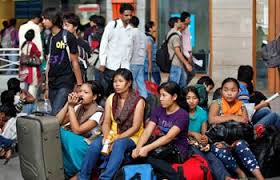
Around 60 per cent women from northeast have faced harassment and discrimination in the four metros -- New Delhi, Mumbai, Kolkata and Bangalore.
While 23 per cent of the respondents admitted to having been harassed by landlords, an alarming 42 per cent said they were often subjected to verbal abuse. A total of 29 per cent reported harassment and molestation.
Two-thirds of the women were studying, the rest worked as teachers, doctors, engineers, government employees, call centre workers and beauticians.
The survey was conducted by the Centre for North East Studies and Policy Research and sponsored by National Commission for Women.
It covered over 300 respondents including landlords, teachers, lawyers, police and social activists. The study found that migrant women are especially vulnerable to deprivation, hardships, discrimination and abuse, and this is 30 per cent more pronounced in case of women from the northeastern region.
Despite being a preferred destination for women migrants, Delhi has the worst record of meting out discrimination with 81 per cent respondents in the city reporting it, followed by Bangalore at 60 per cent. Mumbai emerged as the safest city although there were reports of extortive behaviour by auto and taxi drivers.
Finding rented accommodation emerged as another problem in Bangalore with 38 per cent of the women facing difficulties, though in Delhi only 19 per cent had this problem.
Overcharging of rent by landlords emerged as a common problem in Kolkata. However, some landlords did view the north easterners in a favourable light as they take care of house, rooms and corridors as their own, unlike others, and they are clean, pleasant and honest.






Comments
Add new comment